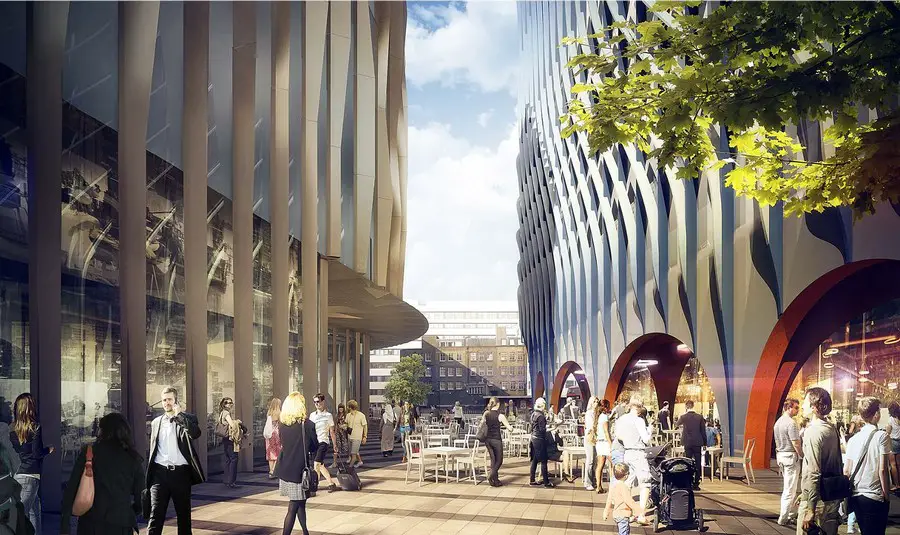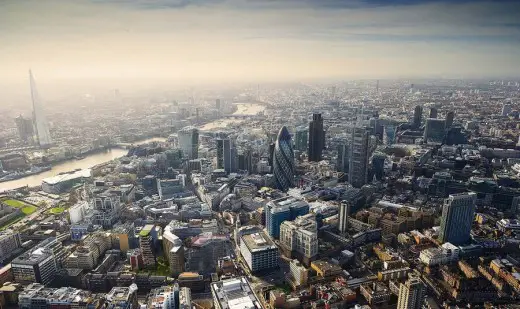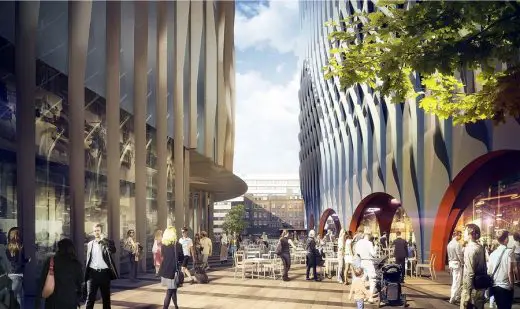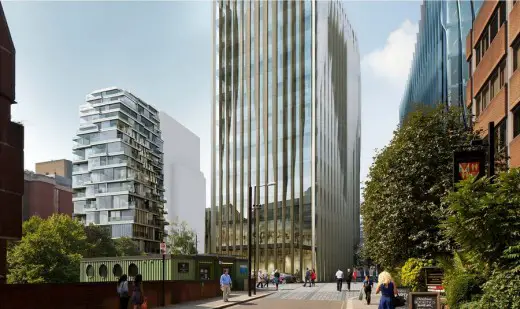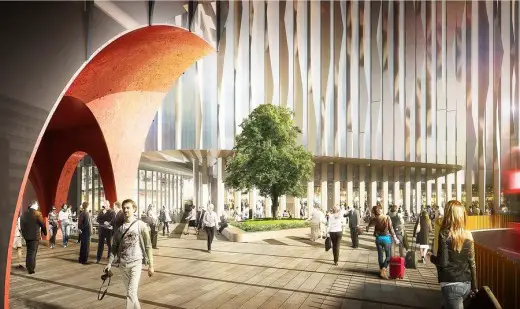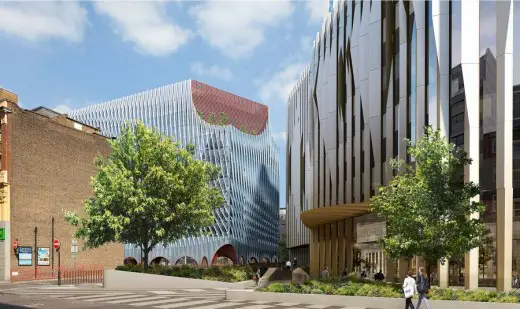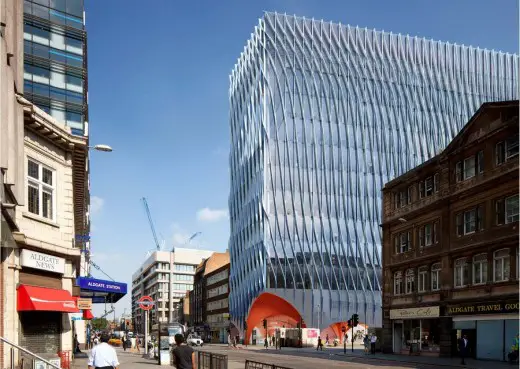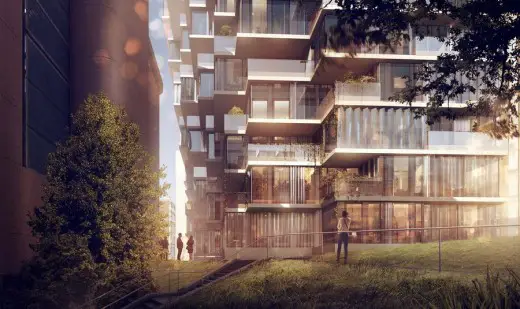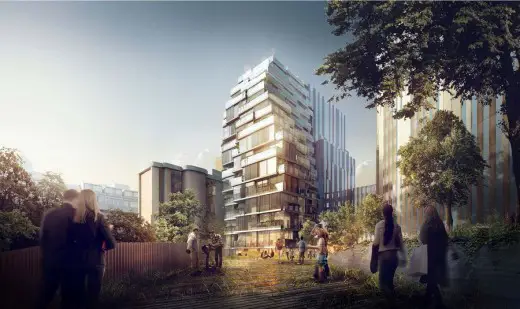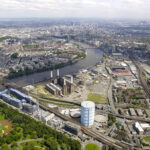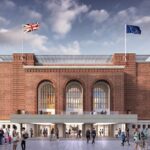Minories Masterplan design, City of London office architecture, UK capital 4C Hotel Group news, Residential buildings architect
Minories East London
City of London Masterplan: Buildings design by ACME, England, UK
16 Dec 2020
Planning Approval for 60 Aldgate
60 Aldgate, Minories London Masterplan
17 Jun 2014
Minories – East London
Design: ACME
ACME’s Minories proposal in London EC3 has been granted planning permission by the City of London Planning Committee. The development includes a 20,000 sqm office building, a 16,500 sqm Hilton Hotel with 370 rooms, and an 8,000 sqm residential building. The scheme has at its heart a new landscaped park and a number of smaller urban squares. Councillors were hugely supportive of the scheme and the application was passed unanimously. The first phase of construction is scheduled to start later this year.
The site is currently occupied by a number of vacant office buildings, constructed in 1977–81. The redevelopment of the site is an important step in the regeneration and expansion of the core fabric of the City of London eastwards beyond the confines of Aldgate, helping to re-structure an area with a very inconsistent physical and social fabric.
An initial feasibility study was prepared in 2012 to investigate potential options for the development of the site, and the adjacent area currently occupied by the Bus Station. Following initial consultations with TfL, it was determined that a flexible masterplan was needed that allowed for a first phase of development to come forward on the core Minories site, without precluding the comprehensive redevelopment of the adjoining bus station in a subsequent phase.
A masterplan for the core site was subsequently developed, utilising some of the existing buildings and leaving the adjoining bus station unaffected. Options were tested for the best allocation of uses across the site, and a number of proposals for the office size and configuration were tested with the City of London, TfL, LUL and Councillors. Within its site boundary the Minories development is a microcosm of this evolving environment.
The site’s strategic location, on Aldgate High Street positions the new office building at a central urban location, and provides the opportunity for the building to play a role in the life and image of the city. The building’s massing was developed to maximise its size while respecting constraints such as the Tower of London view corridor and distance to the site boundary.
The building is one large volume, made permeable at ground floor level by the arcade on the long western and southern façades and by the set back at historic Harrow Alley on the East allowing for better pedestrian flow. The building volume is further broken up by two large scale terraces and by the textured façade which helps to dissolve the large elevation surfaces.
The main access to the building is through a generous double height entrance lobby on Aldgate High Street. The building is partially located above underground lines, which limit the areas for possible foundations to an absolute minimum.
Two potential column locations were agreed with LUL, and an efficient concrete vaulting system was designed accordingly to transition the building load into these two support points. The exposed vault structure forms the walls and ceiling of the entrance hall, where the red pigmented concrete surface provide a unique lobby backdrop.
The façade consists of a curtain wall and two layers of fins that help unify and animate the large surfaces of the façade. The fins give a resonant and dynamic appearance to the office massing and also perform as a shading device. The depth of the fins varies depending on the orientation in order to enhance their performance.
Hotel options were tested to ensure that the hotel had sufficient capacity for known operator demand, and created a new urban form that defined public spaces towards the City. The building with its extension also creates an efficient boundary between residential and commercial neighbourhoods.
The current structural façade raises concerns as it lacks insulation and windows can only be replaced internally. The fins are structural and must be retained in place. It is proposed to replace all glazing and spandrel panels, and to overclad the structural concrete fins with metal fins that retain the verticality of the building and add subtle variation and play to the current regimented fins.
Residential options were tested for viability, daylight impact and visibility to create a development of sufficient size to support the creation of a significant new green park for managed public use. Instead of opting for large vertical surfaces, the building expresses it’s residential scale with smaller volumes that reflect the spatial layout of the flats. This fragmented geometry contributes to the buildings appearance as smaller than it’s volume would suggest, and allows it to subtly shift forwards and backwards to optimise daylight.
In order to address privacy issues created by the expansive use of glass, external metal mesh curtains have been integrated in the façade to give each user an individual and integrated element to control exposure and transparency for each room.
The ambition of the scheme is to provide an architectural proposal that resolves the specific complexities and contradictions of this key site. The highly fragmented yet largely inaccessible site will be made more permeable by creating a series of public spaces. The architecture of the scheme will act as a marker on an urban scale, while taking full account of the sensitivity of the site in relation to townscape and strategic views.
Minories London Masterplan – Building Information
Client: 4C Hotel Group
Design Team: Masterplanning and Architecture: ACME
(Rodrigo Canizares, Monica Capitanio, Anna Czigler, Ann-Kathrin Koehl, Duarte Lobo Antunes, Friedrich Ludewig , Iria de la Peña, David Rieser)
Access Consultant: David Bonnett Associates
Fire Safety: JGA / BB7
Landscape Architect: Gillespies
Planning Consultant: Gerald Eve LLP
Public Consultation: Fourcommunications
Quantity Surveyor: alinea
Services Engineer: BSE3d / RED
Structural Engineer: AKT II
Townscape Consultant: Peter Stewart Consultancy
Traffic Engineer: SKM
Minories – East London Masterplan images / information received from ACME Architects
Location: Minories, EC3, London, England, UK
Minories Property
Contemporary Minories Properties Articles – recent architectural selection from e-architect below:
, England, UK
Design: PLP Architecture, Architects
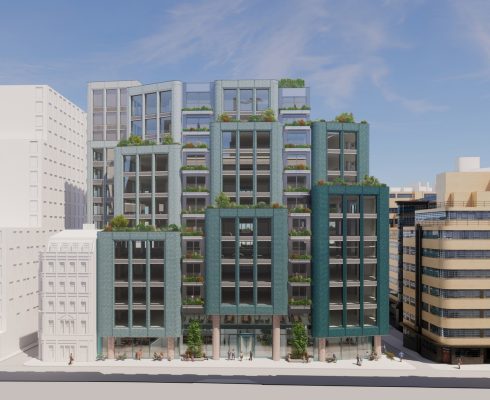
image courtesy of architecture office
30 Minories London office building
60 Aldgate, Minories, City of London, EC3N 1BQ
Design: ACME, Architects
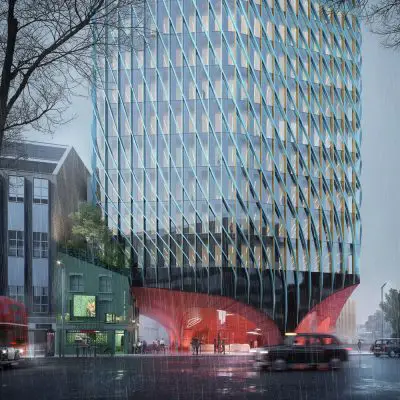
image courtesy of architects practice
60 Aldgate, Minories London
New Motel One Building on the Minories, 24 – 26 Minories, City of London, EC3N
Design: Mackay + Partners, Architects
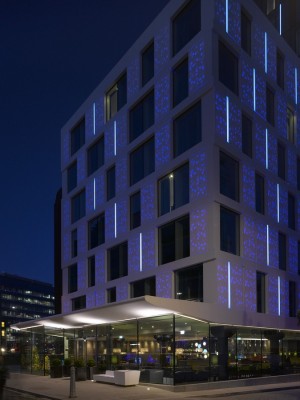
photography courtesy of Mackay + Partners, all rights reserved
Motel One Minories Londong
Hotel Motel One London Tower Hill
Aldgate Buildings – architecture photos
London Buildings
Contemporary London Architecture Designs
London Architecture Designs – chronological list
London Architectural Tours – tailored UK capital city walks by e-architect
London Offices
Fenchurch St
Design: Rafael Vinoly Architects
Walkie Talkie Building
Canary Wharf, Isle of Dogs
Design: Cesar Pelli
Canary Wharf Development
Buildings / photos for the Minories East London Masterplan design by ACME architects for 4C Hotel Group page welcome.

